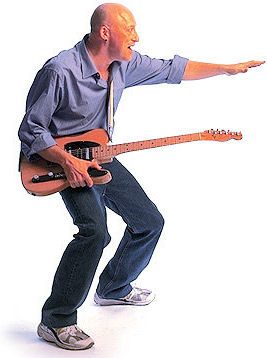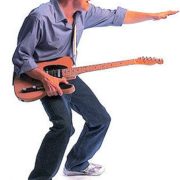DAVID WILCOX COMES TO THOUSAND OAKS
LANGUAGE OF THE HEART
 David Wilcox will be appearing at Thousand Oaks Library presented by Bodie House Music Inc on September 10, 2010. Click here for more information.
David Wilcox will be appearing at Thousand Oaks Library presented by Bodie House Music Inc on September 10, 2010. Click here for more information.
In the classic short story, A River Runs Through It, Norman Maclean wrote that in his family there was little difference between religion and fly fishing. This kind of comparison would resonate with singer-songwriter, David Wilcox. In fact, during the following interview, he draws a similar comparison between music and golf. In his view, there is a little difference between things done well with great love. In the world of David Wilcox, all things really do come together as one…and a song runs through it. His latest album, Open Hands, was recorded without the aid of digital technology, mostly for the honesty of it. In the following interview, Wilcox provides insight into the craft and inspiration of his songwriting. His new album, Reverie, will be released soon.
TR: You just finished teaching a songwriting workshop. Can you tell me about that?
DW: Yes. When I teach, I like to get into the quirkiness of the music. The songs are a kind of musical navigation. There’s this place where the heart cracks open to the subtle variables which help steer my life. This way I don’t miss my story. The song can come in and give a window to how my heart can feel. You know, life is a chance for a bold adventure. Songs wake me up to that. Suddenly I feel I want to make music out of my day and out of my time here. It still does that for me, more than ever. The songs I write direct me deep into the heart. They tell me what I want, that thing in my life that keeps my dreams going. I find I can be the go between for the subtle yearnings of my heart and my conscious mind. It becomes an oasis of joy.
TR: How has your songwriting changed over the years?
DW: You know, for a while, when I was younger, my life was about the songs. Now, the songs are about my life. I came to a place where my relationship with my wife feels like a song; my time with my son feels like a song; my relationship my neighbor feels like a song. The song used to be a place I’d go to escape. Now, the song comes to me. They help me face my life and bring me into my own skin. Now, the songs bring me to my life. They become something to live up to.
TR: How does the writer’s ego work for or against this?
DW: I think in the big picture the original motivation doesn’t matter. It’s like people who go surfing. It may not be for the right reason. But, the ocean is so big, the currents so deep, it doesn’t matter why they’re there. The ocean will work on them, inform them of its depth. It’s the same with songwriting. You start writing because you want to be this or that; but then, it’s like emotional alchemy. You may come at it for selfish reasons. You know, you can take the most painful, debilitating experience and something beautiful can come of it. It becomes healing. Life becomes not something to g et over, but you work on it, and it works you. It’s like when you first play guitar. You think you have two things going on. There’s your left hand, then there’s your right hand, but it’s really one thing. When you get inside the song, the experience that brought it about and the song itself are really one thing. Writing keeps a balance. It’s about balance. You say, ‘wait a minute. Why is music in my life in the first place?’ The reason for writing becomes clearer and clearer until it’s so much more fun. There’s no gatekeeper, no institution or reason for the music. The beauty of the music can be so humbling.
TR: You’ve thought a lot about the reason we make music and write songs.
DW: Yeah. It really does destroy your ego. It’s important to do something impossible. There’s nothing more impossible than music. You know, it destroys your ego. The only thing that keeps the music from really happening is your ‘self.’
TR: Tell me about writers out there who are taking a similar approach to yours. Who would you say are your influences and kindred spirits?
DW: Most of them are not musicians! There are a lot of musicians I love to hear. I may disagree with some, but I if I hear someone get vulnerable; if they speak in song from that place where they are cracked open; if they can write about what they’re afraid of, where they find joy and how it surprises them, then I check off the box and think, ‘this is a good person who will always be my friend. Then, I never see them in the same way. It’s like that song chose them. A lot of times I’ll discover something unique in the song’s meaning, something that really moves me, something with wonderfully complex overtones and the writer doesn’t know and didn’t intend what it inspired in me.
TR: Do any artists you admire in this way come to mind?
DW: I was doing the song school a few days ago and there was this guy there who started writing songs at 60 years old. He wrote this spectacular song. I asked him if I could learn it. I shaped it a little bit and sent it back him. I felt like, ‘okay, I could say it like this..’ It’s a song that breaks the rules but holds this story that’s too hard to touch, yet is holds up lightly, like this beautiful vision. Great songs really do this magic trick like what would happen when the magician looks in the hat and is surprised that the rabbit really is there.
TR: Tell me about your latest recordings.
DW: My latest was released last year called Open Hands.
TR: It was done in analog. Can you tell me why?
DW: Yes. We used old school 16 track recording. It kept us honest. No tricks, no easy edits. It made the performance real. The first track is called, Dream Again. Once you’ve heard it a few times, you’ll notice there’s a hail storm in the middle of the song as we were recording. It sounds like really big brushes on a really big snare. Just before the song drops down to a quiet verse, the hail storm stops. If it hadn’t stopped at just that moment, we would’ve had to re-do the recording. It captured a beautifully realized momentum on tape, a sense of urgency.
TR: What about the latest?
DW: No one’s heard it yet. It’s just been mastered. It’s much more cynical than I’ve been in the past. Like a song which states how institutional religion ruins everything. It’s the first time I’ve written in characters. You know, Randy Newman and Richard Thompson write through characters. They may write about something they disagree with but it tells a story. There’s a song called They Call It Torture, We Call It Freedom. I’m singing about protecting America and just by the way we protect it, it’s no longer what it once was. I didn’t used to write this way, through characters. I was always a little too fearful of being misunderstood.
TR: Well, David, thank for your time. I look forward to seeing your shows in L.A.
DW: Thank you.
Terry Roland is an English teacher, freelance writer, occasional poet, songwriter and folk and country enthusiast. The music has been in his blood since being raised in Texas. He came to California where he was taught to say ‘dude’ at an early age.
DAVID WILCOX COMES TO THOUSAND OAKS
LANGUAGE OF THE HEART













